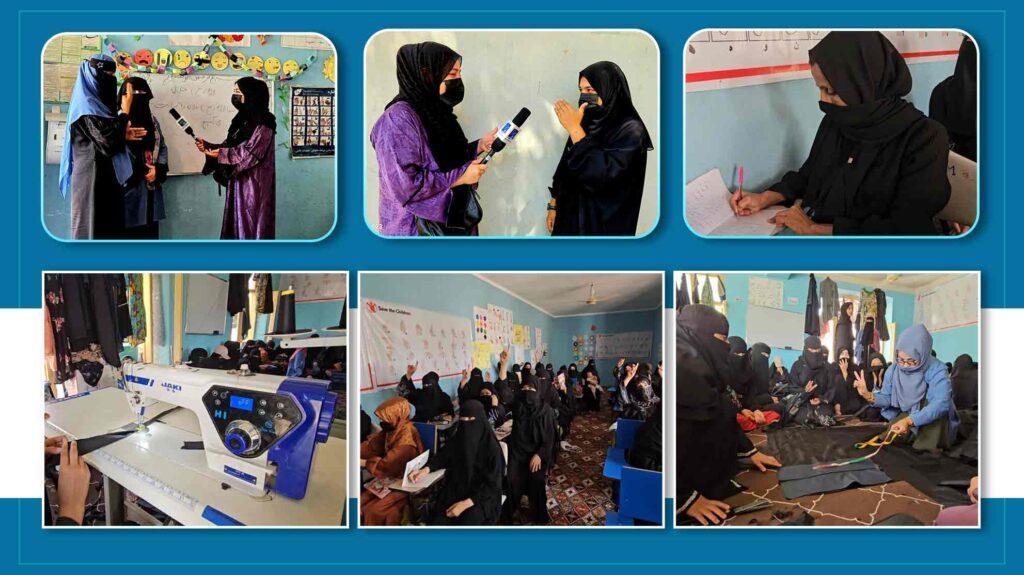
From Silence To Skill: The Struggle Of Deaf Girls For Self-Reliance
SHIBERGHAN (Pajhwok): In Shiberghan, the capital of northern Jawzjan province, a group of young deaf individuals is refusing to surrender to the silence imposed by their hearing impairment.
Instead, they are embracing opportunities to express themselves, connect with others, and build confidence through vocational trainings.
Through a skills development workshop, these youth are learning beadwork, tailoring, and engraving-equipping themselves with practical tools for financial independence and personal growth.
The initiative is helping them break down barriers, communicate using sign language, and support one another on a shared journey toward a brighter future.
The Afghanistan Support Organization for Persons with Disabilities and the Deaf has organized a vocational training workshop for 200 deaf individuals in Shiberghan city.
In this workshop, participants are taught tailoring, bead embroidery, and engraving.
Fatema, Eqlima, Aqela, and dozens of other deaf girls are breaking the silence in this training center. They communicate using sign language and strive to achieve their dreams.
Eqlima: I believe every challenge can be an opportunity for growth
Eqlima, 24, currently learning tailoring in this workshop, told Pajhwok Afghan News through sign language that despite numerous challenges she has faced in life, she achieved significant accomplishments.
She said:“Every day was a new challenge for me. I've lived with deafness since childhood, and this made communication with others difficult. But I never allowed this issue to hinder my progress. I learned to connect with others using sign language and other communication methods.”
She highlighted the importance of her family's support, saying:“There are five people in my family. They have always stood by me and encouraged me to follow my dreams and work hard to achieve them.”
Eqlima is one of thousands of girls deprived of education after the Islamic Emirate imposed restrictions on girls' schooling.
“When the schools closed to us, I was very upset. I was in 10th grade. At times I felt hopeless, but I pulled myself together and started teaching sign language to other deaf girls,” she said.
She expressed gratitude for the establishment of this vocational center:“Here, I am learning tailoring. I believe every challenge can be an opportunity for growth. This workshop is a space for me to express creativity and learn new skills.”
Eqlima added:“I want to inspire others-especially those who face similar challenges. Life is not always easy, but with determination and effort, we can achieve our goals.”
Aqela: I want to learn tailoring and become financially independent
Aqela, another deaf participant who attends the workshop with her sister Zakia to learn tailoring, expressed her concern through sign language about financial struggles:
“Living in a six-member household with limited resources and daily challenges is difficult. We face problems such as lack of essentials, but my sister and I always try to help and support each other.”
During the lessons, Aqela and Zakia paid close attention to the instructor and discussed matters using sign language, reflecting their passion and eagerness to learn the craft.
Aqela added:“We're happy that we can learn new skills and help our family. This work not only gives me financial independence but also brings a sense of worth and satisfaction.”
She noted that before joining the workshop, both sisters were struggling with depression and constantly wondered how to improve their situation:
“Each day is a new opportunity for me to grow and reach my goals. I hope one day I can create a better life for myself and my family.”
Fatema: I never let my deafness hinder my progress
Fatema, another participant who has long lived in silence, is now introducing herself to society through sign language and skilled hands. She contributes to her family's income and also teaches her craft to other deaf girls.
Never allowing her deafness to block her dreams, Fatema now shines a light of hope for other deaf girls through her dedication to learning tailoring.
Fatema expressed joy over the establishment of the tailoring workshop:
“Since childhood, I always wanted to contribute to society like others and become financially independent. I never let my deafness stop me from advancing. With effort and perseverance, I participated in various training programs and gained essential skills.”
She emphasized that deafness was not a weakness:“Many deaf girls are shy about going out and being in society. This place is a good opportunity for learning. They should come, learn tailoring, and build a better future for themselves.”
Fatema, who is also the breadwinner of her six-member family, called on the Islamic Emirate and aid organizations to provide more job and vocational opportunities for deaf girls and boys so they can also achieve self-reliance.
Women's rights advocate
Sharafat Nabizadah, a women's rights activist with a disability in Jawzjan, praised the launch of such vocational programs for the deaf.
Speaking to Pajhwok, she said:“As a woman with a disability who has long been active in defending the rights of disabled people, especially women, I believe that no one should be excluded from social, economic, and political participation due to physical differences.”
She further called on government and non-governmental organizations to expand vocational training programs for persons with disabilities to help them achieve self-reliance.
Head of the deaf association
Zabihullah Qahraman, head of the Deaf Association and the Support Organization for Persons with Disabilities and the Deaf of Afghanistan in Jawzjan, told Pajhwok that training opportunities have been provided to 200 deaf boys and girls in this program.
He added:“Our goal is to highlight the needs of people with disabilities and support them. With the help of institutions, we managed to provide training in tailoring, bead embroidery, handbag-making, engraving, nail driving, and literacy to 130 deaf girls, and in engraving, nail driving, and carpentry to 70 deaf boys.”
However, he also noted:“Many deaf individuals are still left out of these trainings. We don't have enough space or budget to accommodate them. If institutions and the government help us provide courses like carpet weaving and other professions, we could even extend our work to districts and support more deaf individuals.”
He called on the government and aid organizations to support persons with disabilities and not let them become a burden on their families and society.
sa/ma

Legal Disclaimer:
MENAFN provides the
information “as is” without warranty of any kind. We do not accept
any responsibility or liability for the accuracy, content, images,
videos, licenses, completeness, legality, or reliability of the information
contained in this article. If you have any complaints or copyright
issues related to this article, kindly contact the provider above.
Most popular stories
Market Research

- Nodepay Launches Crypto's Largest Prediction Intelligence Platform
- New Crypto Mutuum Finance (MUTM) Nears $17 Million Raised Ahead Of October
- Ethereum Startup Agoralend Opens Fresh Fundraise After Oversubscribed $300,000 Round.
- Nigel Farage To Headline At UK's Flagship Web3 Conference Zebu Live 2025
- Barunson, Studio Behind Parasite, To Launch Nplug IP Remixing Platform On Story And Bring Flagship IP Onchain
- Solo Leveling Levels Up: Korean Billion-Dollar Megafranchise Goes Onchain With Story



















Comments
No comment